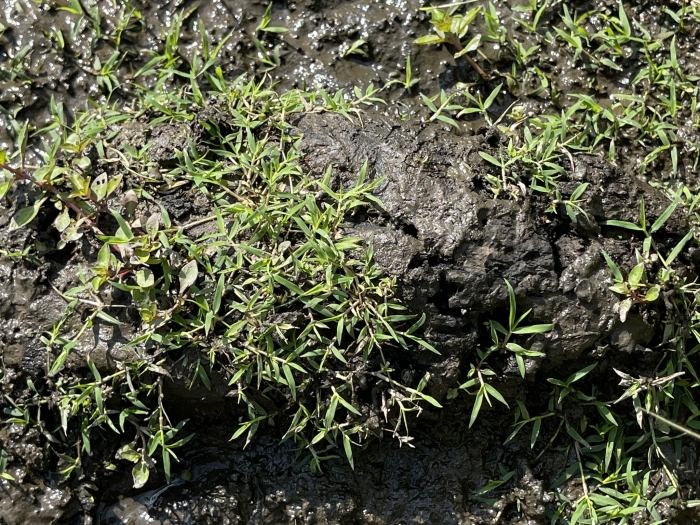Teal Lovegrass
(Eragrostis hypnoides)
Teal Lovegrass (Eragrostis hypnoides)
/
/

© Summit Metro Parks
CC BY 4.0
Image By:
© Summit Metro Parks
Recorded By:
Copyright:
CC BY 4.0
Copyright Notice:
Photo by: © Summit Metro Parks | License Type: CC BY 4.0 | License URL: http://creativecommons.org/licenses/by/4.0/ | Uploader: smpbiologist-rcurtis | Publisher: iNaturalist |

























Estimated Native Range
Summary
Eragrostis hypnoides, commonly known as teal lovegrass, is an annual grass native to a wide range of moist habitats including stream banks, pond margins, and wet meadows throughout the Americas, from Canada to Argentina. It typically forms dense mats with stolons that root at the nodes and produces short, erect stems that can reach up to 4 inches in height. The inflorescences bear small, delicate spikelets that range in color from yellow-green to slightly purple, appearing from late summer to fall. The flowers are not particularly showy but do provide a subtle texture to the landscape.
Teal lovegrass is valued for its ability to stabilize soil in wet areas, making it useful for erosion control and restoration projects. It thrives in full sun to part shade and prefers moist to wet soils, often found on substrates of sand or mud. While it is not commonly used in ornamental horticulture, it can be an excellent choice for naturalized areas or rain gardens. Gardeners should be aware that in ideal conditions, it may self-seed and spread, potentially becoming weedy. It is also a source of food and habitat for various aquatic and semi-aquatic wildlife, contributing to the biodiversity of the area.CC BY-SA 4.0
Teal lovegrass is valued for its ability to stabilize soil in wet areas, making it useful for erosion control and restoration projects. It thrives in full sun to part shade and prefers moist to wet soils, often found on substrates of sand or mud. While it is not commonly used in ornamental horticulture, it can be an excellent choice for naturalized areas or rain gardens. Gardeners should be aware that in ideal conditions, it may self-seed and spread, potentially becoming weedy. It is also a source of food and habitat for various aquatic and semi-aquatic wildlife, contributing to the biodiversity of the area.CC BY-SA 4.0
Plant Description
- Plant Type: Grass
- Height: 0.1-0.5 feet
- Width: 0.2-0.5 feet
- Growth Rate: Slow
- Flower Color: N/A
- Flowering Season: Summer, Fall
- Leaf Retention:
Growth Requirements
- Sun: Full Sun, Part Shade
- Water: High
- Drainage: Fast, Medium, Slow
Common Uses
Erosion Control, Low Maintenance, Water Garden
Natural Habitat
Native to stream banks, pond margins, and wet meadows throughout the Americas
Other Names
Common Names: Teal Lovegrass, Smooth Creeping Lovegrass, Teel Lovegrass
Scientific Names: , Eragrostis hypnoides, Eragrostis reptans var. contracta, Eragrostis reptans var. laxior, Eragrostis reptans var. pygmaea, Erosion hypnoides, Megastachya gouinii, Megastachya gouinii, Megastachya hypnoides, Neeragrostis hypnoides
GBIF Accepted Name: